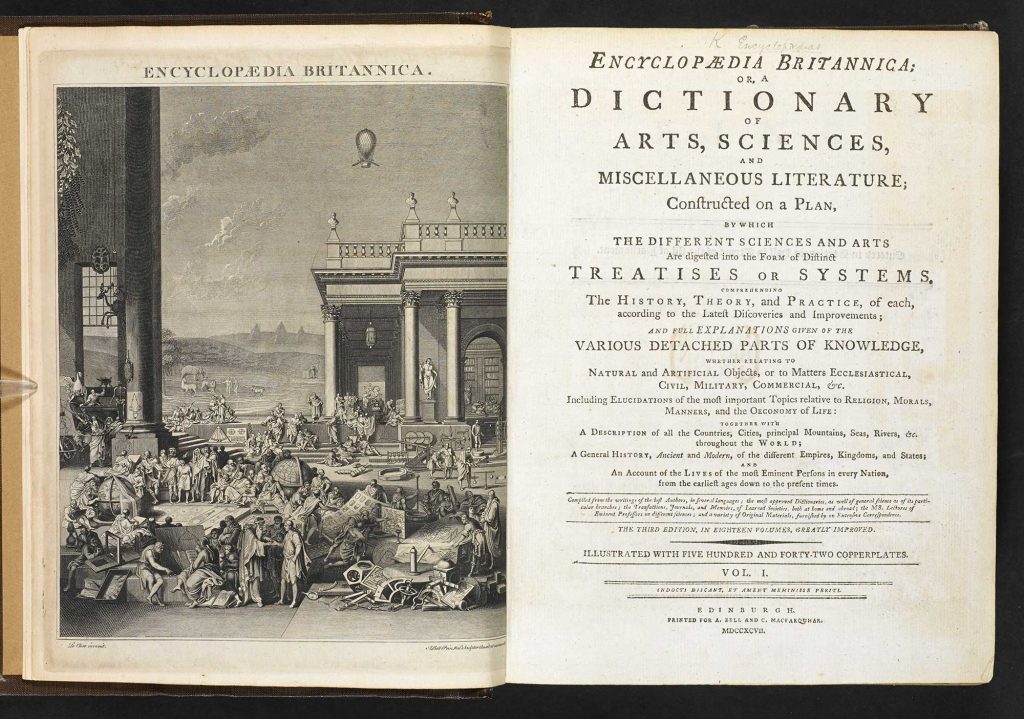Before Wikipedia: The Encyclopaedia Britannica Posted by Gary Locke on Apr 26, 2018 in Culture
Before there was Google and Wikipedia, the source of all knowledge for English speakers was the vast, multi-volume Encyclopaedia Britannica. Many homes had shelves devoted to it, teachers and scholars depended on it, and its prestigious reputation among such publications has remained unsurpassed for over three centuries, though much of that reputation may have depended upon wily salesmanship.
The word encyclopedia (as it is spelled in the US) comes to us from the Greek enkyklios paideia, “general education,” which meant to the ancient Greeks a well-rounded education. There have been encyclopedias in various cultures and languages for over 2000 years. While there have been many English language encyclopedias, the Britannica remains the oldest continuous version still in production, if no longer in print.

Photo from British Museum, public domain
History and Volumes
It was first published in Scotland between 1768 and 1771 in weekly installments for subscribers, then bound into three volumes. The Britannica was originally distinguished by scholarly essays on subjects which were grouped together, along with stunning illustrations related to the topics. Prior to this, encyclopedias published topics in alphabetical order, more like a dictionary. The first edition cited Benjamin Franklin and John Locke among its authors, since their writings were heavily quoted. In time, those essays would be written for the Britannica by some of the greatest minds in history. Sigmund Freud wrote about psychoanalysis, Albert Einstein on physics, Sir Walter Scott on chivalry, and even US Presidents John F. Kennedy and Lyndon Johnson contributed to various editions. In fact, over 100 Nobel prize winners and five presidents have been published within its pages. The 2007 print version of the Britannica has 4,411 contributors.
It could take years for editions to be written, nine years for the third edition, causing problems for the early final bound volumes. History moved faster than publishing firms. Appendices grew increasingly larger and necessary. That third edition, with over 14,500 pages, required another 1600-page supplement published just a few years later. In all, there have been fifteen official editions. By 1933 all editions were being continually reprinted and revised, a decision made possible by the publication’s fame and demand.
Welcome to America
Its original stated purpose was to be a comprehensive reference work and educational tool. By 1974, however, the publishers declared their wish for it to “systematize all human knowledge.” Reviewers and institutions seemed to believe that it had succeeded. Libraries throughout America would seek budget increases from town councils whenever a new edition was published. Time Magazine once called it “The patriarch of the library.” But, most importantly, the average person bought it.
Ownership and publishing rights of the Britannica have changed hands many times, but it achieved an American foothold after World War I, when it was purchased by Sears Roebuck and Co. which was already selling the encyclopedia through its mail-order catalogues. Offices were relocated to Chicago in 1920 and, by the end of the decade, 2000 salesmen across the US were selling it door-to-door on a commission of between $500 – $600 for each successful sale. Considering that this was the beginning of The Great Depression, such a paycheck was indeed lucrative! The problem, however, was that the lure of such a paycheck led to unscrupulous sales tactics, and the legend of the unsavory encyclopedia salesman was born.
So much information was packed into the Encyclopedia Britannica that it required two volumes just as an index! In all, the last printed version in 2010 amounted to 32 volumes and over 32,000 pages, at an estimated weight of 140 pounds!
You can still read it today in digital format. You won’t be able to rest it on your chest as you read it, however. And no salesman will ring your doorbell. Still, what price would you pay for all the knowledge of the world at your fingertips?

Build vocabulary, practice pronunciation, and more with Transparent Language Online. Available anytime, anywhere, on any device.




